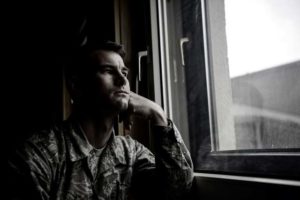
It’s that time of year again, when the warm summer fades into autumn chills and frosty winters. The skies become grayer and the sun barely shines. For some, autumn and winter are welcome breaks from the summer heat; but for others, the change in seasons may cause dread.
Some individuals suffer from Seasonal Affective Disorder, also referred to as Depressive Disorder, with the seasonal pattern. As the name suggests, it’s a form of depression that occurs during the seasonal change, particularly after summer until spring.
SAD occurs more often in northern regions, such as Europe and Canada.
“People living in locations close to the equator experience very low rates of seasonal depression due to their exposure to consistent sunlight year-round,” said U.S. Air Force Capt. Abigail Wolfe, 86th Medical Group licensed clinical psychologist. “In Germany, daylight hours become significantly shorter in the winter months and SAD appears to be linked to diminishing daylight.”
Melatonin, a sleep-related hormone, and circadian rhythm can be disrupted by the sudden change in sunlight exposure. Serotonin, a chemical in the brain that affects mood, is thought to play a role in SAD. Lack of sunlight can cause a drop in this chemical, which may trigger depression.
“The decrease in sunlight may disrupt the body’s internal clock, reduce the levels of feel-good neurochemicals — such as serotonin — and disrupt the hormones that regulate sleep patterns and overall mood states,” Wolfe said.
Symptoms may be similar to other types of depression such as feelings of hopelessness, despair, apathy, lack of motivation, wanting to oversleep, anxiety, and lethargy. Similar to a physical injury, the disorder should be treated and cared for properly, but it’s important to note the symptoms can be on a spectrum.
“For those mildly impacted, basic interventions such as maintaining a regular sleep and exercise schedule may prove effective,” Wolfe said. “The use of light therapy employing a SAD lamp that emits at least 10,000 lux has proven to be an effective way to deal with this condition, and symptoms that come with it.”
People on a mild level of seasonal pattern depression may benefit from taking Vitamin D supplements, exercising regularly, maintaining a good sleep schedule, and eating nutritious foods.
For severe symptoms such as suicidal thoughts or behavior, anxiety, eating disorders, alcohol dependency, or substance abuse, it’s a good idea to seek professional help. Ramstein Air Base has various options available such as the mental health clinic, Military Family Life Counseling and Chaplains.
“People with more severe symptoms of depression may require a higher level of care including talk therapy and medication,” Wolfe said.
No one is ever alone in their internal battles, even if it might feel like it. SAD is common and there’s no shame in experiencing it. In the U.S. alone, SAD is estimated to affect 10 million people, which means 1 in 30 people suffer from it. Just because it’s not visible doesn’t mean it’s not real.
“The important takeaway point is: resources are available to help people struggling with symptoms of seasonal depression through the dreary winter months,” Wolfe said.
To make an appointment with the Ramstein Air Base mental health clinic, call DSN 479-2390 or commercial at 06371-46-2390. If suicide is a concern, call the Military Crisis Line at (1-800)-273-8255 and select 1.


